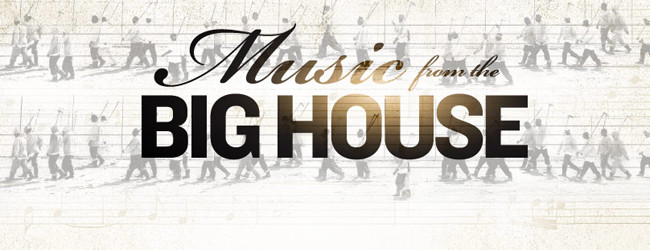
‘My name is Rita Chiarelli and I sing the Blues,’ are the first words spoken by the narrator and star of a remarkable new documentary, Music From the Big House. Shot live on location in Louisiana State Maximum Security Prison (aka Angola Prison) deep in Bayou country, Chiarelli first went to Louisiana to hear the source of the Blues and then discovered that there was remarkable new music being created. Equally, no one knows the sad defiance that defines the Blues better than prison inmates. As Chiarelli notes, musicians as legendary as Freddy Fender, Odea Mathews and Lead Belly had served time in this same penitentiary.
The bulk of the documentary, shot in a richly textured black-and-white by cinematographer Steve Cosens under the direction of Bruce McDonald, is Chiarelli rehearsing and presenting a concert at Angola Prison accompanied by a band composed of inmates – convicted murderers, armed robbers, rapists and so forth. The thought is inescapable while listening to the interview segments with these largely jocular, soft-spoken men – What happened? What made musicians become murderers?
Largely, the question goes unanswered, for the sociological emphasis is more on music than mayhem, which is probably a wise choice. If one believes at all in rehabilitation, the focus is best kept on the present and future, not the past.
Ultimately, the film makes the decision to stay in the now, and not the past. For as Chiarelli says, ‘When you’re singing, you’re not angry.’ Anger, after all, is what destroyed these men’s lives in the first place: anger that was either a momentary madness or a pre-meditated plan of destruction. And there rests the intriguing irony. Blues as a lyrical form deals with the kaleidoscope of Pain: loss, rejection, hate, rejection, failure, and just plain being alone. The music, however, through its long rehearsals requiring the singer or player to spend hours in virtual meditation drawing every small drop of meaning out of a song, is always, in Bob Marley’s term, a redemption song. Life and madness destroy; however music heals.
As to the music itself, it is driven by Chiarelli’s raw, bold voice thundering out a selection of both standards and new songs. In particular, one cannot listen to Chiarelli’s rendition of “These Four Walls” (which has less than nothing to do with Miley Cyrus) without hearing the clank of a tin cup, filled with tears, echoing down a long corridor of bars and broken dreams. Currently in the midst of a 70 show, 60 city tour featuring the songs from Music From the Big House, Chiarelli has joined a special class of musicians that includes Johnny Cash (Live from San Quentin), B.B. King, (Live in Cook County Jail) and Alan Lomax in taking the time to record the thoughts of, and provide entertainment to, those whom society prefers to forget.


